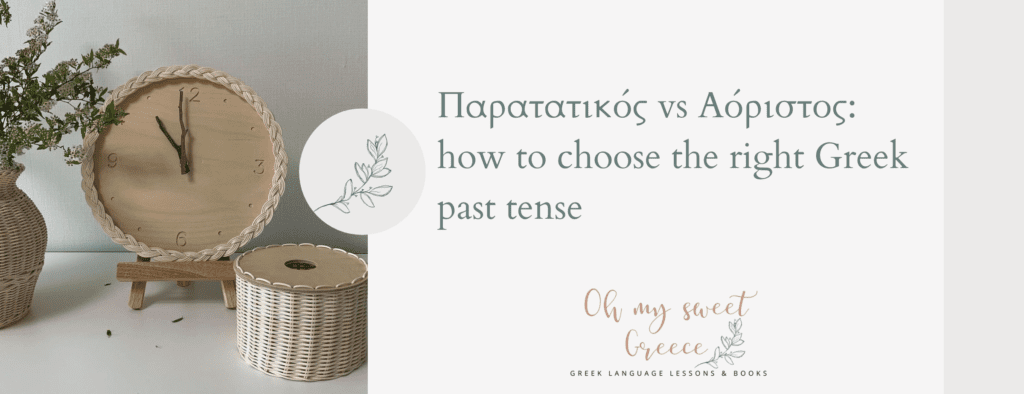
Have you ever paused during your Greek lessons, wondering whether you should say έτρωγα or έφαγα?
You’re not alone! The Greek past tense can feel confusing — even for advanced students — especially when choosing between Αόριστος (simple past) and Παρατατικός (imperfect / past continuous).
If you’ve studied Greek with a teacher, a textbook, or an app like Duolingo, you’ve probably wrestled with this exact question. In this post, we’ll break it all down with real-life examples you can use right away — no boring grammar theory, just clear, everyday Greek.
Table of contents
Choosing the correct Greek past tense
Παρατατικός = what was happening (past action in progress or repeated past action)
Αόριστος = what happened (completed event in the past)
Think of it like this:
Παρατατικός is like watching a movie — you see the action unfolding.
Αόριστος is like seeing a photo — the event is done, over, complete.
This one distinction will unlock most of your confusion.
Let’s see it in action!
Real-life scenarios for each Greek past tense
Talking about a book
Παρατατικός: Διάβαζα αυτό το βιβλίο όλο το καλοκαίρι.
→ I was reading this book all summer (past action in progress – emphasis on the duration).Αόριστος: Διάβασα αυτό το βιβλίο το καλοκαίρι.
→ I read this book during the summer (completed event: I finished the book).
Meeting someone
Παρατατικός: Συναντούσα τον Γιάννη κάθε Πέμπτη.
→ I used to meet John every Thursday (repeated past action).Αόριστος: Συνάντησα τον Γιάννη την Πέμπτη.
→ I met John last Thursday (one-time event).
Talking about food
Παρατατικός: Έτρωγα το μεσημεριανό μου, όταν με πήρες τηλέφωνο.
→ I was eating my lunch when you called (past action in progress).Αόριστος: Έφαγα το μεσημεριανό μου χθες.
→ I ate my lunch yesterday (the action is complete, I finished my meal).
Observe how we use two different past tenses here. “I was eating” describes an action that was already in progress — it sets the scene. Then, “you called” shows a quick, completed action that interrupts it. We use the Past Continuous for the action happening in the background and the Simple Past for the action that breaks in. It’s a simple and natural way to show how one thing was happening when something else suddenly occurred!
The “polite” Παρατατικός: sound more native
Greek speakers often use Παρατατικός to make questions and requests sound softer and more polite.
Ήθελα να σας ρωτήσω κάτι.
→ I wanted to ask you something (polite, gentle).Μπορούσα να έχω έναν καφέ;
→ Could I have a coffee? (less direct than “Μπορώ”)
Another way to make requests sound even more polite is by adding “θα” in front of the verb. This makes the sentence feel even softer, as if you’re expressing something more tentative or considerate.
Θα ήθελα να σας ρωτήσω κάτι.
→ I would like to ask you something (even more polite, with a soft tone).Θα μπορούσα να έχω έναν καφέ;
→ Could I possibly have a coffee? (a very gentle request)
This is very similar to English phrases like:
“I was wondering…”
“I just wanted to ask…”
Use these forms, and you’ll sound way more natural — and courteous!
Quick practice: try It yourself!
Now it’s your turn! Write your own sentences using both Παρατατικός and Αόριστος.
Feel free to share them in the comments below, and we’ll correct them for you! The more you practice, the more natural it will feel.
Here are some examples to inspire you:
Παρατατικός: Στην παιδική μου ηλικία, έπαιζα πάντα με τα παιδιά της γειτονιάς.
→ I was always playing with the neighborhood kids when I was young. (habitual action)Αόριστος: Χθες, έγραψα μια έκθεση για το σχολείο.
→ Yesterday, I wrote an essay for school. (completed action)Παρατατικός: Ακούγαμε μουσική όλη μέρα χτες
→ We were listening to music all day long yesterday. (ongoing action / emphasis on the duration)Αόριστος: Είδα την ταινία που μου πρότεινες.
→ I watched the movie you recommended. (completed action)Παρατατικός: Περπατούσα κάθε πρωί.
→ I was walking every morning. (habitual action)Αόριστος: Πήγα για ψώνια το Σάββατο.
→ I went shopping on Saturday. (completed action)Παρατατικός: Δούλευα σε αυτό το project για ώρες χθες.
→ I was working on this project for hours yesterday. (ongoing action / emphasis on the duration)Αόριστος: Αποφάσισα να φύγω νωρίς χθες.
→ I decided to leave early yesterday. (completed action)
Coming soon: your Greek Past tense survival guide
Struggling to remember which verbs take which tense? Don’t worry, help is on the way!
We’re working on a free downloadable guide.
Want early access? Click here.
